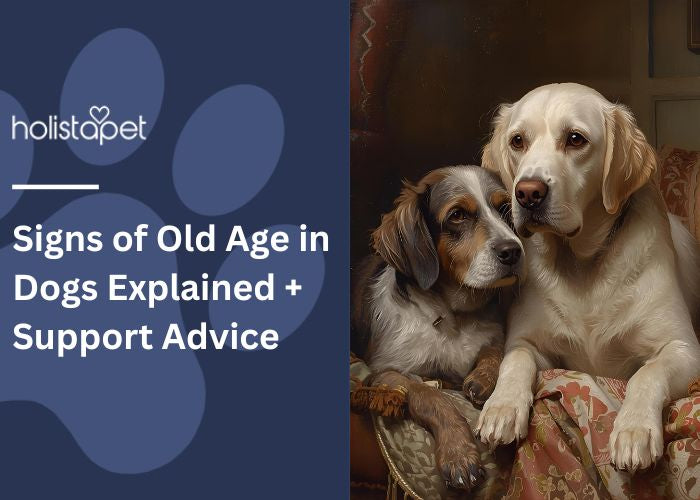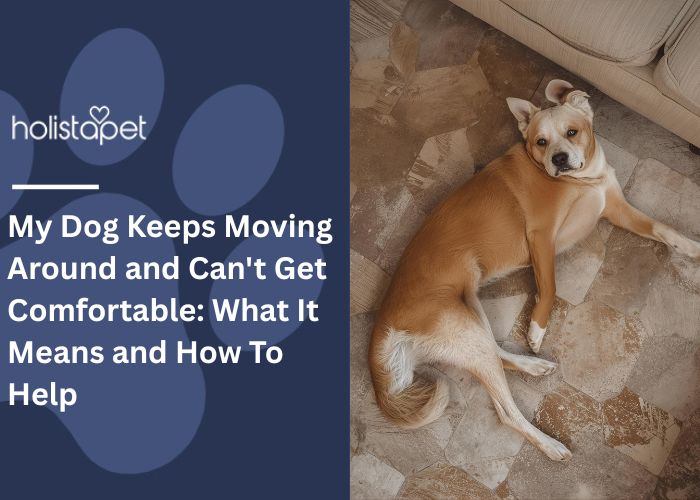Your pup's getting older, but that just means more wisdom...and maybe a little more snoring. The signs of old age in dogs can sneak up slowly: a few gray hairs, napping longer, hesitant jumps, or slower walks around the block.
Every elderly dog wears their golden years differently, but each one deserves comfort, patience, and plenty of love. With the right care, your aging furry friend's days can be cozy, happy, and full of smiles.
When Do Dogs Start To Show Signs of Aging?

Many dogs start showing signs of aging between seven and ten years old, but it depends on their size and breed. Small dogs often stay spry for longer, while giant breeds may slow down sooner.
You might notice your senior dog naps more, walks a bit slower, or skips a game of fetch. These common signs mean their bodies are changing. Paying attention now helps keep your pet's well-being on track, so they can enjoy every moment of their life.
Physical Signs of Aging in Dogs
Aging shows up first in the body. The physical signs can be easy to spot once you know what to look for, such as:
-
Graying Fur and Coat Changes. White or gray hairs around the muzzle and paws are classic signs your dog's getting older. Their coat may feel coarser or thinner, too.
-
Stiffness, Slower Movement, and Joint Pain. Senior dogs tend to stretch before moving and may avoid stairs or jumping. Gentle walks can help ease soreness.
-
Reduced Hearing and Vision. Some older canines ignore calls or bump into furniture, which is common as the senses dull with age.
-
Changes in Appetite or Weight. Weight gain or loss may hint at slower metabolism or other health conditions.
-
Dental Problems and Bad Breath. Gum disease, tooth decay, and stinky breath often appear with age, so regular dental care matters more than ever.
Common Behavioral Signs as Dogs Age
Elderly dogs often change in how they act and respond to daily life. These behavioral clues can appear slowly, but they reveal a lot about your pup's comfort and mental well-being:
-
Sleeping More and Playing Less. Senior dogs love naps. Their energy dips, and long snoozes replace endless play sessions.
-
Confusion, Disorientation, or Memory Lapses. Some older pets pace, stare into space, or forget familiar people. These can be early signs of canine cognitive dysfunction.
-
Increased Irritability or Anxiety. Aging pups might get upset easily or feel more nervous around noise or other pets.
-
House Training Accidents or Restlessness at Night. Forgetfulness or discomfort can cause nighttime pacing or surprise puddles indoors.
Common Health Issues in Senior Dogs
As dogs grow older, their bodies handle life a little differently. Senior dogs can face certain health challenges that call for extra care and attention:
-
Joint Swelling and Mobility Problems. Older dogs often move more slowly or show stiffness after naps. Comfortable bedding and short, frequent walks can help.
-
Digestive Changes and Sensitive Stomachs. Senior tummies may not handle the same meals as before, so switching to gentle, age-appropriate dog food helps.
-
Weakened Immune System. Aging can affect how well your pup fights off illness, so regular vet visits are vital.
-
Cognitive Decline (Dog Dementia). Confusion, pacing, or decreased interaction with family members may signal cognitive decline and deserve extra patience and support.
How To Care for an Aging Dog

A senior dog thrives with steady routines, gentle activity, and plenty of affection. Schedule regular vet checkups to catch any health issues early and keep your pet's health on track. Adjust their diet to suit a slower metabolism and changing needs. Aim for proper nutrition that supports joint and heart health.
Also, keep exercise light but consistent with short, frequent walks or easy games. Add ramps or soft beds to make their environment senior-friendly. Small comforts can turn their later years into peaceful, happy days.
Natural Ways To Promote Comfort and Wellness
Start with a healthy diet that supports weight balance, muscle strength, and energy. Add gentle exercise to keep joints moving and spirits high. Regular brushing, cozy naps, and belly rubs also go a long way toward boosting your dog's mood and comfort.
Consider natural additions to their wellness routine, like calming supplements or a gentle massage. These small, caring touches can make older dogs feel cared for and ready to enjoy every sunny afternoon nap.
Support Mobility and Calmness With HolistaPet CBD for Dogs
CBD (cannabidiol) works with your dog's natural system to promote calmness and help ease soreness or stiffness. It helps aging pets relax, move comfortably, and feel more at ease during daily routines.
HolistaPet's CBD collection for dogs offers trusted wellness options made in the USA with broad-spectrum CBD and a superfood-packed hemp seed oil base. Each product is gluten-free, dairy-free, non-GMO, and free from preservatives.
Choose from our CBD oils, calming chews, or mobility treats to support your pup's comfort and well-being. Clean, natural, and effective—HolistaPet makes caring for senior dogs simple and rewarding.
Boost Health With Multivitamins, Probiotics, and Joint Support Chews
Senior dogs need extra support to stay active, alert, and happy. HolistaPet's wellness chews bring together nutrients that help your pup feel their best inside and out:
-
Multivitamin Soft Chews pack vitamins, salmon oil, glucosamine, and MSM to support shiny coats and flexible joints.
-
Probiotic Soft Chews help ease stomach troubles and restore balance with a blend of beneficial bacteria and sweet potato goodness.
-
Joint Support Chews combine turmeric, chondroitin, and MSM for smoother movement and daily comfort.
Create a Peaceful, Comfortable Routine for Your Senior Dog
Older dogs love predictability, so keep meals, walks, and bedtime at the same times each day to reduce stress and confusion. Create cozy rest spots with soft bedding and easy access to water. Keep their favorite toys nearby to encourage gentle play or mental stimulation. Soft background music or calm lighting can also make them feel at ease.
Most of all, spend quiet time together. Gentle affection and patience go a long way in helping your senior dog feel calm and deeply loved.
When To Talk to Your Vet About Aging Concerns

Schedule vet visits at least twice a year once your dog reaches senior status, even if they seem fine. Early care keeps small problems from turning into bigger ones.
Talk to your vet if you notice sudden weight loss, tiredness, or changes in your dog's behavior. Slower motions, joint aches, or vision loss can also signal age-related changes that need attention.
Your vet can recommend tests, supplements, or lifestyle adjustments to support your senior dog's health. Open communication helps your best friend stay happy and active throughout their life.
FAQs - Signs of Aging in Dogs
How can I tell if my dog is in pain from aging?
You might notice slower movements, stiff joints, or changes in posture. Some dogs may whine, lick sore spots, or seem less eager to play. Keep an eye on their energy and reactions when touched. If the soreness persists or worsens, schedule a vet visit to rule out any underlying cause.
What's the average lifespan of a senior dog?
The average lifespan depends on size and breed. Small dogs can live 14–16 years or more, while giant breeds often reach around 8–10 years. Middle-aged dogs become "senior" at different times, usually around seven years old. Every dog ages differently, so focus on keeping them comfortable and active for as long as possible.
Can senior dogs still exercise safely?
Yes, senior dogs benefit from gentle, consistent exercise. Light walks, swimming, or slow games of fetch keep muscles strong and joints flexible. Avoid high-impact activities that strain their body. Always tailor the exercise routine to their comfort level and energy. If your dog tires quickly or shows soreness, scale back and let them rest.
How can CBD help older dogs feel more comfortable?
CBD works naturally with their body to help ease stiffness, restlessness, and soreness from aging. Products like HolistaPet's CBD oils, chews, and treats can help senior dogs stay relaxed and content. Our wellness products are carefully made with broad-spectrum CBD and natural ingredients. Regular use may help your pup feel more at ease during their senior years.
What's the best food for an older dog?
Choose dog food made specifically for senior dogs, as they're designed for easier digestion and balanced nutrients. Look for high-quality proteins, healthy fats, and fiber to support energy, joints, and heart health. Skip heavy treats and focus on proper portion sizes to prevent weight gain. Hydration also matters, so keep fresh water available at all times.
Final Thoughts: Recognizing Aging In Dogs and Care Tips
Watching your dog grow older is bittersweet, but it's also a chance to return the loyalty they've given you for years. With patience, gentle care, and a focus on their comfort, you can make their senior years truly special.
Small changes, like adjusting their diet, keeping exercise light, and offering natural wellness products, are smart solutions. In addition, HolistaPet supports pet parents with trusted options like CBD products that help senior dogs stay active and at ease.
Growing older is part of the journey. With love and mindful care, your faithful companion can thrive well into their golden years.


 CBD Oil for Dogs - Fast Acting
CBD Oil for Dogs - Fast Acting
 Chicken Flavored CBD Oil For Dogs - Easy Dose
Chicken Flavored CBD Oil For Dogs - Easy Dose
 Salmon Flavored CBD Oil For Dogs - Highly Rated
Salmon Flavored CBD Oil For Dogs - Highly Rated
 CBG Oil for Dogs and Cats - Loved by Thousands
CBG Oil for Dogs and Cats - Loved by Thousands





Leave a comment
All comments are moderated before being published.
This site is protected by hCaptcha and the hCaptcha Privacy Policy and Terms of Service apply.